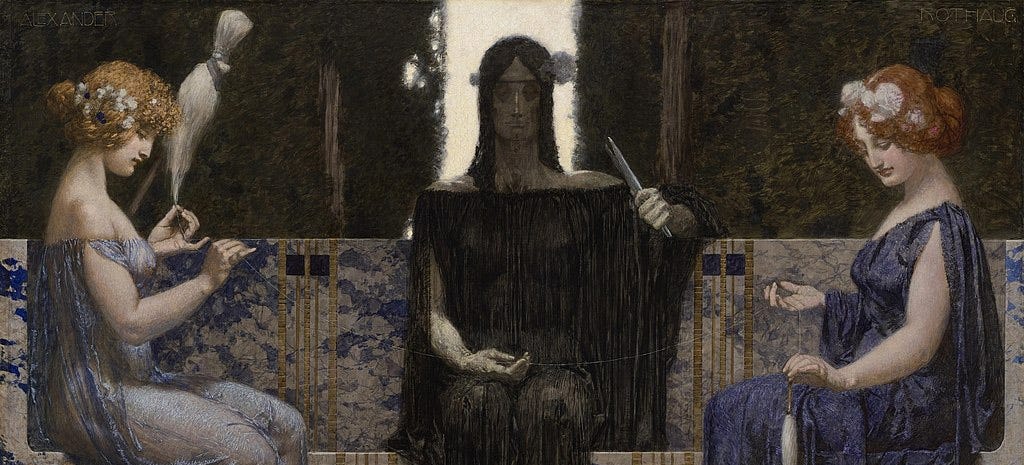The Surprising, Ancient, Reality Creating Origin of “Weirdo”
Hey, weirdo. ‘Weirdo’ is one of those words you sometimes instant replay in your head for any context you might have missed. It could mean something endearing, but often, it’s at least a yellow flag of ‘otherness’.
The first records of the term ‘weirdo’, meaning someone who does or says weird things, come from the US in 1950’s (1). We likely get the odd, negative connotation, however, from Shakespeare’s “Weird Sisters”, “Wayward Sisters” or “Three Witches” in MacBeth, who with their witchy, supernatural activities, set an ominous tone in the play, to say nothing of eventually leading him to his death (2).
Weird derives from the Old English noun ‘wyrd’, essentially meaning ‘fate.’ In the 15th century ‘weird’ meant “having power to control fate” (9). In the 8th century, the plural ‘wyrde’ had begun to appear in texts as a gloss for Parcae, the Latin name for the Fates, or Moirai - the three goddesses who spun, measured, and cut the thread of life (3). This came from Proto-Germanic ‘wurthiz’ (“that which comes”) spoken as early as 500 BC. This was derived from the Proto-Indo-European (4,500 to 2,500 BC) root ‘wer’, meaning “to turn, bend”, “to become” (9). This is an impressively continuous and consistent use of a single word across a 6,500 year, multi-language telephone game. At least up until post WWII suburban America conflated and buried trauma and ‘deviance’ with heavy drinking, Valium, and keeping up with the Joneses.
While the mythology of the Fates had existed before, the Greek poet Hesiod proposed the depiction we have to this day. When a child was born, Clotho, the spinner, spun the thread of the baby’s life from the fibers of consciousness (4)(7). She gave the thread to Lachesis, who predicted and measured the thread of that person’s life and decided how long it would be (5). She then handed it to Atropos, who would examine the thread, consider the actions and consequences of the person’s life, and choose how and when they would die by cutting the thread (4)(5). This is, incidentally, where we get the phrases “fabric of life” and “thread of life” (5).
A similar concept of fate can be found in Old Norse mythology, where the three Norns, called Urðr (fate), Verðandi (becoming) and Skuld (tax, payment) rule over the lottery of fate (7). Relatedly, the three stages of the thread of existence, from creation and origin, to measuring and managing, to knowing what the thread of life actually is near its return to the infinite, also map to and mirror the Triple Goddess, the three stages of the sacred feminine: the maiden, the mother and the crone (10).
Intriguingly, the Fates were daughters of Nyx, the Greek Goddess of Night, and had no father. Nyx was one of the first primordial beings to exist on earth with Gaia, the primordial deity of earth, shortly after primordial deities began emerging at all out of Chaos, the void and emptiness that preceded all things (6). The Fates have quite a lineage being a scant second generation out of oblivion itself.
As one can imagine beings whose intrinsic origins precede the noisier, more selfish and existentially provincial, down-the-line, run-of-the-mill drama deities, the Fates performed their duties impartially. They did not, for the most part, interfere in the affairs of those for whom they timelessly spun the threads of lives from primordial consciousness (5). So while the thread of one’s life declared or imprinted a tendency of how that life would go (fate), what one chose to do with or become, because of, or despite what had been woven, was actually up to that conscious being (destiny). We consciously get to choose what we do with the thread of life that the Fates hand us.
In essence, a weirdo is literally someone who chooses what they become as they weave their own consciousness into the fiber of existence spun straight out of existential consciousness itself.
So let that freak* flag fly, weirdo.
* Btw, ‘freak’ comes from ‘friken’ (to move nimbly or briskly), which comes from ‘frician’, which means “to dance”. But that’s for another post.
References
The Faites (Moirai) — In Charge of Human Destiny, Nina Jay, symbolsage.com
The Fates (The Moirai) in Greek and Roman Mythology — The Sisters of Fate
Nyx — Greek Goddess of Night, Nina Jay, symbolsage.com
The weird lottery of fate unravelled, Zabaan.com
The Moirai and the Erinyes — The Fates and the Furies of Ancient Greece, greekerthanthegreeks.com/
The Three Fates In Greek Mythology: Misrepresentations Of Women, Kritika Sharma, herculture.org



